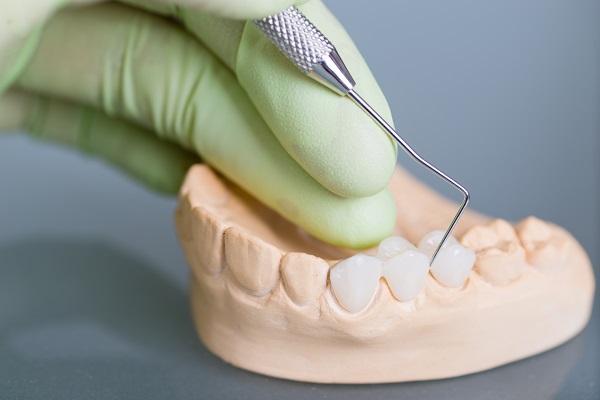Signs of a Loose Dental Bridge

A loose dental bridge can occur for many reasons, including excessive wear and tear, damage to the abutment teeth and periodontal concerns. The sooner that you can detect a loose or damaged dental bridge, the better chance you have to make an inexpensive repair and save the dental bridge from becoming lost.
How to know if your dental bridge is loose
A dental bridge may be loose if it can be moved, if there is pain while chewing with the affected area, if there are periodontal issues that do not go away or if the gums and adjacent teeth are painful or have increased sensitivity to hot and cold sensations.
Can move the dental bridge with a finger or the tongue
The most notable sign of a loose dental bridge is the ability to move it with the tongue or a finger. A dental bridge should be securely fixed into the mouth just the same as a natural tooth. If there is a loose tooth, then it is important to notify the dentist and schedule a visit for a check-up and repair as soon as possible, to prevent the dental bridge from becoming even looser and potentially falling out.
Pain while chewing or an inability to chew food
If the person cannot feel the dental bridge move, that it does not necessarily mean that it is not loose or damaged. Another sign of a loose dental bridge is pain while chewing. An inability to chew in the area of the dental bridge also indicates a potentially loose dental bridge that needs repair.
Increased tooth and gum pain and sensitivity
A loose dental bridge is often accompanied by tooth and gum pain and sensitivity, especially if the loose bridge is caused by periodontal disease or issues with the abutment teeth. A loose tooth may also constantly touch the gums and surrounding teeth, which contributes to any pain and sensitivity.
An awkward feeling in the mouth that does not go away
A loose dental bridge often feels awkward to the patient. This can affect their ability to eat and speak. It may also simply feel uncomfortable or as if the dental bridge is dislodged from its appropriate position. If this is the case, then the dentist most likely needs to make a repair to the dental bridge.
Signs of periodontal disease, deep pockets or gum erosion
Periodontal concerns are a common cause of a loose dental bridge. If gingivitis or periodontitis develops, then the dental bridge is likely to become loose. Deep gum pockets and gum erosion can also affect the condition of the dental bridge.
Learn more about dental bridge treatment and repairs
If you have a loose dental bridge or would like to learn more about dental bridge treatment in general, call our team to arrange a convenient time to visit. Our team offers dental bridge treatment to deal with issues of missing teeth and can make repairs to loose or damaged dental bridges.
Request an appointment here: https://uptownnycdental.com or call Uptown Dental Group at (646) 693-0625 for an appointment in our New York office.
Check out what others are saying about our dental services on Yelp: Dental Bridges in New York, NY.
Related Posts
Dental bridges replace missing teeth, restoring smile appearance and bite function. They are noninvasive tooth replacements that rely on the surrounding teeth or dental implants for support. A general or cosmetic dentist will create a dental bridge custom-fit to the patient’s smile, ensuring a natural-looking restoration and optimal oral health.Dental bridges are named for the…
When a person has a missing tooth, one of the quick and affordable options they might consider is a dental bridge. Missing teeth affect daily dental functions and social interactions. This article covers what a dental bridge is, how it works, and how a bridge addresses a gap in the smile due to missing teeth.A…
Are you considering a dental bridge because you are missing some of your teeth? Or maybe thinking about dental implants? When missing teeth, it is necessary to find a tooth replacement option so that you can continue to be in good oral health. There are a few things that are important to consider when looking…
Many are familiar with ceramic and metal crowns but may be less familiar with the unique advantages of zirconia crowns for repairing damaged teeth. This review highlights and answers frequently asked questions about zirconia crowns to help you decide if they may be the right type of dental restoration for you.Common questions that patients have…
